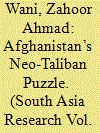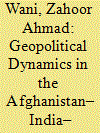| Srl | Item |
| 1 |
ID:
178427


|
|
|
|
|
| Summary/Abstract |
This article examines the emergence of the neo-Taliban and its encroachment in non-Pashtun regions after the debacle of the old Taliban following the post 9/11 US-led NATO intervention in Afghanistan. It seeks to understand what aspirations drive the neo-Taliban and how they have reframed their ideology after 2001, leading to growing acceptance of a future role for the neo-Taliban in Afghanistan, while foreign-led counterinsurgency seems to fail. The article argues that due to the extremely fractious nature and continuing precariousness of the Afghan political climate, the neo-Taliban could emerge as a formidable power, with an agenda of bringing peace and stability to the entire ‘Af-Pak’ region. However, to what extent the neo-Taliban may be successful in countering widely held perceptions that it is a Pashtun nationalist movement, antagonistic to women, dissent and minorities, remains part of the challenging puzzle, as much for analysts as for the movement itself, which is not trusted in terms of delivering good governance in Afghanistan.
|
|
|
|
|
|
|
|
|
|
|
|
|
|
|
|
| 2 |
ID:
188813


|
|
|
|
|
| Summary/Abstract |
Since the partition of the subcontinent in 1947, the geopolitics of South Asia has been shaped by a dynamic triangular relationship among Afghanistan, India and Pakistan on which depend prospects of peace, governance and stability in the South Asian region. This article examines how and why the Afghanistan–India–Pakistan triangle emerged and how it affects the entire South Asian region as a matter of geopolitics. The article also analyses why major strategic and political shifts occurred in these complex relations after the fall of the Taliban rule in Afghanistan in 2001 and ventures to provide some comments on more recent developments. The evolution and nature of the triangular engagements lie in the overlapping policies of these three countries. Hence, I identify their interactions as constituting a dynamic triangle. This article argues that strategic positioning and concerns and claims for political space have shaped their relationship to such an extent that if something bad happens in one of the three countries, this affects the position of the other two as well. That is why the current re-alignments in Afghanistan have crucial implications for the whole region, not just in terms of their respective foreign policy objectives but also for the long-term harmony, peace, progress and stability in the whole region.
|
|
|
|
|
|
|
|
|
|
|
|
|
|
|
|
| 3 |
ID:
196573


|
|
|
|
|
| Summary/Abstract |
This article examines the position of women in Afghanistan after the Taliban return to power in August 2021. Importantly, the anti-modern and anti-western political ideology of the Taliban played a substantial role in how they came to power again through unorthodox and unconstitutional means, exercising extensive total control and power in an unconstitutional and arbitrary manner. The article argues that the current situation in Afghanistan is bleak, especially for women. It thus therefore proposes that the Taliban must embrace a pluralistic balancing of space for all religious perspectives within Islam and local cultures of Afghanistan to be recognised as a political entity responsible for legitimate governance in Afghanistan. Simply trying to repress women, whether rhetorically or actually, is indeed beyond minimum expectations of good governance.
|
|
|
|
|
|
|
|
|
|
|
|
|
|
|
|